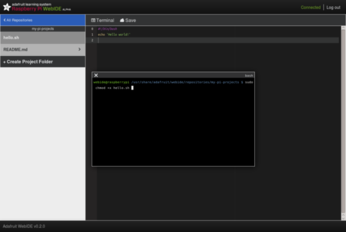Raspberry Pi WebIDE

Productivity Sauce
If you are serious about using your Raspberry Pi (RPi) as a platform for writing and testing code, you'll appreciate the WebIDE software developed by Adafruit. This server-based solution turns your RPi into a flexible coding environment which you can access and use from any machine with a browser. Although WebIDE is geared towards Python, it can handle other languages, including Ruby, JavaScript, and shell scripts. Better yet, WebIDE seamlessly integrates with the Bitbucket code hosting service.
Using the provided installer script, you can deploy WebIDE in an RPi in a matter of minutes. Alternatively, WebIDE can be installed manually, and the project's website provides instructions on how this is done. By default, WebIDE is configured to run on port 80, which can be a problem if your RPi is already running the Apache web server on that port. In this case, you need to configure WebIDE to run on another port. To do this, open the config.js file in the nano editor using the sudo nano /usr/share/adafruit/webide/config/config.js command, specify an alternative port, and restart WebIDE.
Once installed, WebIDE guides you through the process of linking the environment to your Bitbucket account. It also conveniently adds the my-pi-projects repository for you, so you can start coding right way. WebIDE features a built-in terminal which can be useful for running commands and testing the code. Every time you hit the Save button, WebIDE saves the changes and commits them to the repository.
WebIDE is still at a very early stage of development, so it might contain bugs. But even in its current form, it looks like a very promising project worth keeping an eye on.
Comments
comments powered by DisqusSubscribe to our Linux Newsletters
Find Linux and Open Source Jobs
Subscribe to our ADMIN Newsletters
Support Our Work
Linux Magazine content is made possible with support from readers like you. Please consider contributing when you’ve found an article to be beneficial.

News
-
Photoshop on Linux?
A developer has patched Wine so that it'll run specific versions of Photoshop that depend on Adobe Creative Cloud.
-
Linux Mint 22.3 Now Available with New Tools
Linux Mint 22.3 has been released with a pair of new tools for system admins and some pretty cool new features.
-
New Linux Malware Targets Cloud-Based Linux Installations
VoidLink, a new Linux malware, should be of real concern because of its stealth and customization.
-
Say Goodbye to Middle-Mouse Paste
Both Gnome and Firefox have proposed getting rid of a long-time favorite Linux feature.
-
Manjaro 26.0 Primary Desktop Environments Default to Wayland
If you want to stick with X.Org, you'll be limited to the desktop environments you can choose.
-
Mozilla Plans to AI-ify Firefox
With a new CEO in control, Mozilla is doubling down on a strategy of trust, all the while leaning into AI.
-
Gnome Says No to AI-Generated Extensions
If you're a developer wanting to create a new Gnome extension, you'd best set aside that AI code generator, because the extension team will have none of that.
-
Parrot OS Switches to KDE Plasma Desktop
Yet another distro is making the move to the KDE Plasma desktop.
-
TUXEDO Announces Gemini 17
TUXEDO Computers has released the fourth generation of its Gemini laptop with plenty of updates.
-
Two New Distros Adopt Enlightenment
MX Moksha and AV Linux 25 join ranks with Bodhi Linux and embrace the Enlightenment desktop.


Raspberry Code